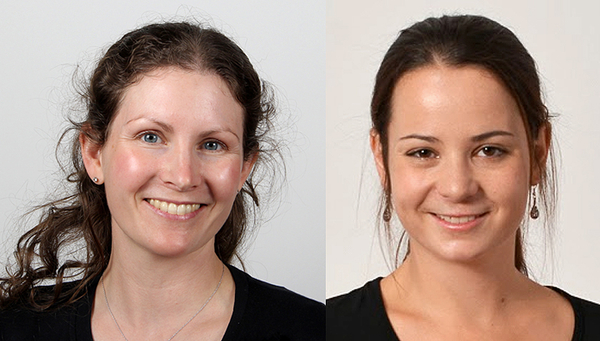News Detail
Cornelia Twining and Barbora Trubenová appointed assistant professors at ETH Zurich
May 23, 2024 |
Environmental scientist Cornelia (Lily) Twining joined Eawag as a postdoctoral researcher in 2021. Her current research, for which she has received an SNSF Starting Grant, focuses on the question of how climate change affects food webs. In many ecosystems, climate change can alter the quantity, quality and timing of available food. This can lead to a discrepancy between the time at which animals need food and the time at which the food is available. In addition, even when food is available, animals may experience nutrient deficiencies if the nutritional value of their resources changes. Twining’s research is particularly focused on aquatic insects, which are an important source of omega-3 polyunsaturated fatty acids for terrestrial animals such as riparian birds. Because the development and fatty acid synthesis of insects can be highly temperature-dependent, it is unclear how climate change will affect their ecological function across aquatic and terrestrial ecosystems. From 1 June, Cornelia Twining will provide her expertise to the Department of Environmental Systems Science at ETH Zurich and will also bring collaborations with Eawag and WSL to ETH Zurich. With her Starting Grant, Twining will also become group leader in the Fish Ecology and Evolution Department at Eawag.
Biophysicist Barbora Trubenová is currently a postdoctoral researcher at ETH Zurich. Her research involves the mathematical modelling of how drug resistance evolves and spreads in pathogens. In particular, she will investigate the role of reproductive strategies, number of chromosome sets and lifestyle of bacteria, fungi and helminths in the evolution of drug resistance. These aspects are crucial for the prediction of resistance, but have often been overlooked until now. In her work she uses a combination of pharmacodynamics, population genetics and evolutionary theory to create realistic models that can be tested experimentally. Funded by an SNSF Starting Grant, Barbora Trubenová’s position as assistant professor also involves working as a group leader in the Aquatic Ecology Department at Eawag. Eawag offers a unique environment for the study of drug resistance, as aquatic ecosystems are often exposed to various pollutants and microbes, potentially accelerating resistance evolution.
Congratulations to Lily Twining and Barbora Trubenová!
Cornelia W. Twining studied environmental sciences at Yale University and completed her doctorate at Cornell University. In 2018, she came to the Max Planck Institute of Animal Behaviour in Konstanz with a Humboldt Research Fellowship. In 2021, she started as a postdoctoral researcher with a Marie Curie Research Fellowship in the Fish Ecology and Evolution Department at Eawag.
Barbora Trubenová studied biophysics at Comenius University in Bratislava and completed her doctorate at the University of Manchester. She was the recipient of a Marie Skłodowska Curie Fellowship and a Spark Grant from the Swiss National Science Foundation. She has been a postdoctoral researcher at ETH Zurich since 2020.
Cover picture: Cornelia Twining (left, photo: Eawag) and Barbora Trubenová (right, photo: IST Austria)

